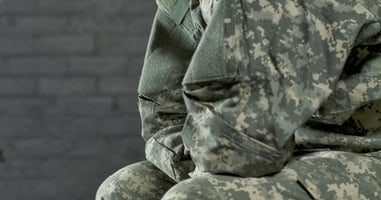Homelessness in conjunction with severe mental illness increases early mortality risk in veterans,...
Veterans With and Without SMI Equally Likely to Receive COVID-19 Vaccine

Veterans with serious mental illness (SMI) are just as likely as veterans without SMI to be vaccinated against COVID-19, according to a study published this week in Psychiatric Services in Advance.
“Because individuals with [SMI] are at higher risk for COVID-19 infection and death, COVID-19 vaccine uptake in this population is a key concern,” wrote Taona P. Haderlein, Ph.D., M.A., of the Veterans Emergency Management Evaluation Center in North Hills, Calif., and colleagues. “Researchers have noted that fear of contracting COVID-19 via COVID-19 vaccination, as well as the ‘infodemic’ of misinformation from media outlets regarding the COVID-19 pandemic and vaccine rollout, may exacerbate preexisting mistrust among some individuals with [SMI] and increase vaccine hesitancy.”
Haderlein and colleagues analyzed Veterans Health Administration (VHA) electronic health record data, identifying over 4.8 million veterans aged 18 and older who had an outpatient visit from March 1, 2018, through February 29, 2020. These records included information on veterans who had an SMI diagnosis (diagnoses included schizophrenia, schizoaffective disorder, or bipolar disorder) as well as veterans without an SMI diagnosis. Veterans who received COVID-19 vaccinations were identified from December 1, 2020, to June 1, 2021. The authors also looked at other health behaviors noted in the electronic health record data, such as history of smoking or influenza vaccinations.
The researchers found that 48% of those diagnosed with SMI received a COVID-19 vaccination, compared with 46% of those without SMI. "[A]fter weighting based on demographic and clinical characteristics, we found that patients diagnosed as having serious mental illness and those diagnosed as having no serious mental illness were equally likely to receive a VHA COVID-19 vaccination,” the authors wrote. They also found that patients with SMI were more likely than those without to be current smokers and to have a history of influenza vaccination.
“VHA outreach activities may have helped address COVID-19 vaccine access barriers that are common in the population of individuals with serious mental illness,” the authors wrote, pointing to VHA efforts such as calling eligible patients to schedule vaccination appointments, disseminating educational information, and allowing flexibility in appointment scheduling. “Similar approaches might improve vaccine uptake for individuals outside the VHA,” they wrote.
For related information, see the Psychiatric Services article “Access to Care for Veterans With Serious Mental Illness During the COVID-19 Pandemic.”
(Image: iStock/PeopleImages)
Don’t Put Off Voting in APA’s 2022 Election!
The voting period for APA’s 2022 election closes in less than two weeks. You can vote by using the ballot you were emailed or clicking on “Vote Today” on APA’s website. Take time to learn more about this year’s candidates by reading the Special Edition APA Election Newsletter and viewing the archived town halls in which candidates responded to key questions. The deadline to vote is Monday, January 31, at 11:59 p.m. ET.





